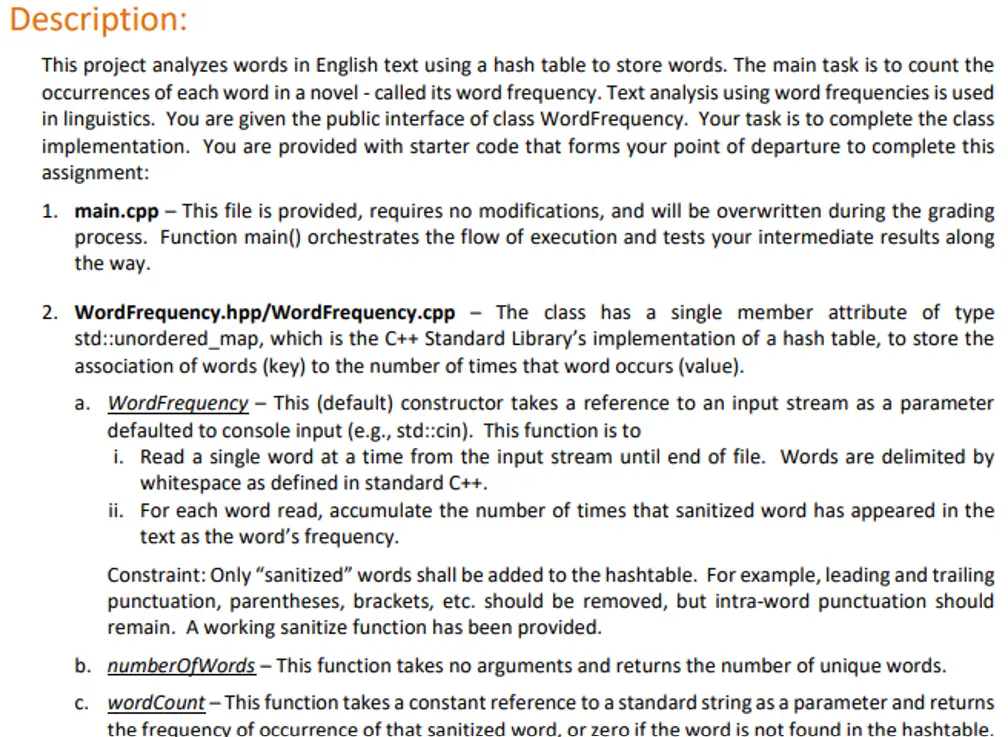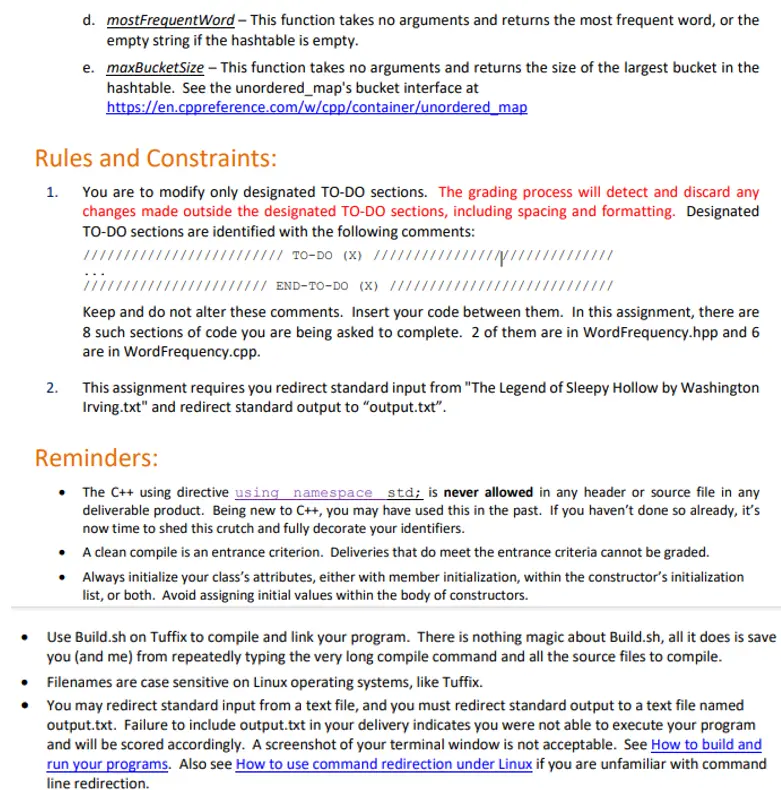Welcome to our comprehensive sample solution for a C++ programming assignment, designed to offer valuable C++ assignment help. In this project, we guide you through the process of implementing a word frequency analyzer using C++. By leveraging the power of hash tables, this assignment demonstrates how to efficiently count and store the occurrences of words in a given text. Through this example, you'll explore essential concepts such as text sanitization, input stream processing, and hash table manipulation, all while adhering to best practices in C++ programming. This sample solution is a great resource for students looking to enhance their understanding of text analysis and data structuring in C++. If you're seeking additional assistance, our team is ready to provide expert help with programming assignments to ensure your success.
Question:


Solution:
Word frequency cpp file
///////////////////////// TO-DO (1) //////////////////////////////
/// Include necessary header files
/// Hint: Include what you use, use what you include
///
/// Do not put anything else in this section, i.e. comments, classes, functions, etc. Only #include directives
#include "WordFrequency.hpp"
/////////////////////// END-TO-DO (1) ////////////////////////////
// unnamed, anonymous namespace providing non-member private working area
namespace
{
std::string sanitize( const std::string & word )
{
constexpr char bad_char[] = " \t\n\b\v_-\"'(){}+/*,=.!?:;"; // leading and trailing characters to be removed
static std::locale locality;
auto startIndex = word.find_first_not_of( bad_char ); // start with the first non-bad character
if( startIndex == std::string::npos ) startIndex = word.size(); // if the word contains only bad characters ...
std::size_t count = 0; // assume the word contains only bad characters ...
auto endIndex = word.find_last_not_of( bad_char ); // end with the first non-bad character
if( endIndex != std::string::npos ) count = endIndex - startIndex + 1; // number of characters to use in results
auto result = word.substr( startIndex, count ); // strip the leading and trailing bad characters
for( auto & c : result ) c = std::tolower( c, locality ); // convert to lower case
return result;
}
} // unnamed, anonymous namespace
// Implement WordFrequency::WordFrequency( std::istream ) - See requirements
///////////////////////// TO-DO (2) //////////////////////////////
WordFrequency::WordFrequency(std::istream &iStream) {
std::string word;
while (iStream >> word) {
word = sanitize(word);
if (!word.empty()) {
++wordFrequencyMap[word];
}
}
}
/////////////////////// END-TO-DO (2) ////////////////////////////
// Implement WordFrequency::numberOfWords() const - See requirements
///////////////////////// TO-DO (3) //////////////////////////////
std::size_t WordFrequency::numberOfWords() const {
return wordFrequencyMap.size();
}
/////////////////////// END-TO-DO (3) ////////////////////////////
// Implement WordFrequency::wordCount( const std::string & ) const - See requirements
///////////////////////// TO-DO (4) //////////////////////////////
std::size_t WordFrequency::wordCount(const std::string &word) const {
auto it = wordFrequencyMap.find(sanitize(word));
return it != wordFrequencyMap.end() ? it->second : 0;
}
/////////////////////// END-TO-DO (4) ////////////////////////////
// Implement WordFrequency::mostFrequentWord() const - See requirements
///////////////////////// TO-DO (5) //////////////////////////////
std::string WordFrequency::mostFrequentWord() const {
std::string mostFrequent;
std::size_t highestFrequency = 0;
for (const auto &pair : wordFrequencyMap) {
if (pair.second > highestFrequency) {
highestFrequency = pair.second;
mostFrequent = pair.first;
}
}
return mostFrequent;
}
/////////////////////// END-TO-DO (5) ////////////////////////////
// Implement WordFrequency::maxBucketSize() const - See requirements
///////////////////////// TO-DO (6) //////////////////////////////
/// Hint: see the unordered_map's bucket interface at https://en.cppreference.com/w/cpp/container/unordered_map
std::size_t WordFrequency::maxBucketSize() const {
std::size_t maxSize = 0;
for (std::size_t i = 0; i < wordFrequencyMap.bucket_count(); ++i) {
maxSize = std::max(maxSize, wordFrequencyMap.bucket_size(i));
}
return maxSize;
}
/////////////////////// END-TO-DO (6) ////////////////////////////
Word frequency hpp file
#pragma once
///////////////////////// TO-DO (1) //////////////////////////////
/// Include necessary header files
/// Hint: Include what you use, use what you include
///
/// Do not put anything else in this section, i.e. comments, classes, functions, etc. Only #include directives
#include <unordered_map>
#include <string>
#include <istream>
#include <iostream>
/////////////////////// END-TO-DO (1) ////////////////////////////
class WordFrequency
{
public:
WordFrequency( std::istream & iStream = std::cin); // (default) constructor, add words from file to hash table
std::size_t numberOfWords ( ) const; // return the number of unique words
std::size_t wordCount ( const std::string & word ) const; // return the number of occurrences of the given word
std::string mostFrequentWord( ) const; // return the most frequent word
std::size_t maxBucketSize ( ) const; // return the size of the largest bucket in the hash table
private:
///////////////////////// TO-DO (2) //////////////////////////////
/// The class should have a single instance attribute of type std::unordered_map, which is the C++ Standard Library's
/// implementation of a hash table, to store the association of words (key) to the number of times a word occurs (value).
std::unordered_map<std::string, std::size_t> wordFrequencyMap;
/////////////////////// END-TO-DO (2) ////////////////////////////
};
Similar Samples
Discover our comprehensive collection of expertly solved programming samples at Programming Homework Help. Each example is meticulously crafted to showcase top-quality solutions. Explore our work and feel confident in choosing our services to tackle your assignments with ease.
C++
C
Database
Embedded System
Python
C++
Data Structures and Algorithms
Python
C++
C++
C++
C++
C++
C++
C++
C++
C++
C++
C++
C++
